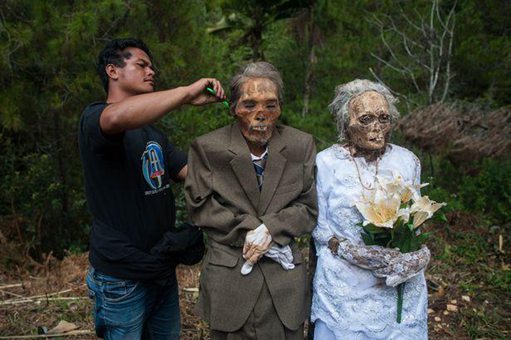导读:对当地人来说,亲人的去世并不意味着离开,他们想通过这种方式让家人重新团聚。

The picture shows an annual ritual where villagers dig up the bodies of their dead relatives before washing, grooming and dressing them up in fancy new clothes.
图片所展示的是一个一年一度的仪式,在仪式上村民们会挖出已故亲人的尸体,梳洗打扮之后为他们穿上漂亮的新衣服。
Families in the Indonesian province of Toraja in South Sulawesi perform the act to keep their relatives alive in their hearts and minds.
在印度尼西亚南苏拉威西的托拉雅地区,人们这样做是想要亲人们一直活在他们的心中,从未离开。
As part of the zombie ceremony, even the skeletons of children are exhumed.
作为僵尸仪式的一部分,就连儿童的骷髅也被挖了出来。
Damaged coffins are fixed or replaced before the mummies are walked around the area by following a path of straight lines during the ritual, called Ma’nene, or The Ceremony of Cleaning Corpses.
仪式期间,干尸会在一条笔直线路的区域附近“行走”。在这之前,人们会把损坏的棺材修好或者替换掉。这个仪式叫做Ma’nene,又称清洁尸体的仪式。
For Torajans, the death of the body isn’t seen as an abrupt event and attempts are made to keep them part of the family.
对于托拉雅地区的人们来说,他们并不把肉体的消亡视作突发事件,他们会想办法将已故亲人保留为家庭的一部分。
Late loved ones are tended at home for weeks, months, or even years after death and funerals are often delayed to gather relatives.
为了召集亲友,葬礼经常会延期举行。之后,已故的亲人会被安放在家中长达数周、数月、甚至好几年。
In Toraja society, the funeral ritual is also most elaborate and expensive event.
在托拉雅的社会里,葬礼仪式也是最精细和最花钱的事情。
According to their ancient belief system, the spirit of a dead person must return to his village of origin.
根据他们古老的信仰体系,死者的灵魂必须回到他的出生地。
So if a person died on a journey, the dead person would be walked back home.
如果一个人在异乡死去,那么亲人会让他的尸体“走”回家乡。







